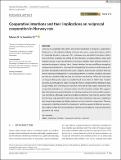Cooperative intentions and their implications on reciprocal cooperation in Norway rats
Abstract
One way to cooperate with others and avoid exploitation is reciprocal cooperation. Reciprocity is the selective helping of those who were cooperative before, which is commonly based on outcomes. Yet, outcomes may not reflect intentions, i.e., if an individual is unable but willing to help. Humans, including children, show such intention-based reciprocity. However, it is unclear whether other animals consider intentions in reciprocal settings. Here, I tested whether Norway rats (Rattus norvegicus) reciprocate help based on intentions by manipulating the outcome while keeping the partner’s cooperative inten-tions the same. Subjects experienced a partner that was able to help by providing food via a movable platform. In another condition, the same partner was unable to help because the platform was blocked. When the roles were exchanged afterwards, subjects provided food more often to ‘able’ than ‘unable’ partners, even though the latter attempted to help. I compare these findings to data using ‘willing’ and ‘unwilling’ partners that were able to help. Again, rats based their cooperative behaviour on outcomes rather than the intention to help. This suggests that rats reciprocate primarily based on outcomes and seem to not consider cooperative intentions. Although, subjects provided consistently less food to partners that did not help, they provided them with some help. Potentially, rats use a cognitively less demanding strategy by helping defectors a bit to maintain cooperation. Thereby, cooperation might be resistant to situations in which an apparent defector was actually unable to help, but had cooperative intentions, and might be a good cooperation partner in the future.
Citation
Schweinfurth , M K 2021 , ' Cooperative intentions and their implications on reciprocal cooperation in Norway rats ' , Ethology , vol. 127 , no. 10 , pp. 865-871 . https://doi.org/10.1111/eth.13144
Publication
Ethology
Status
Peer reviewed
ISSN
0179-1613Type
Journal article
Description
Funding: This study was financially supported by the Swiss National Science Foundation, grant number 31003A_156152, which was awarded to Michael Taborsky.Collections
Items in the St Andrews Research Repository are protected by copyright, with all rights reserved, unless otherwise indicated.

